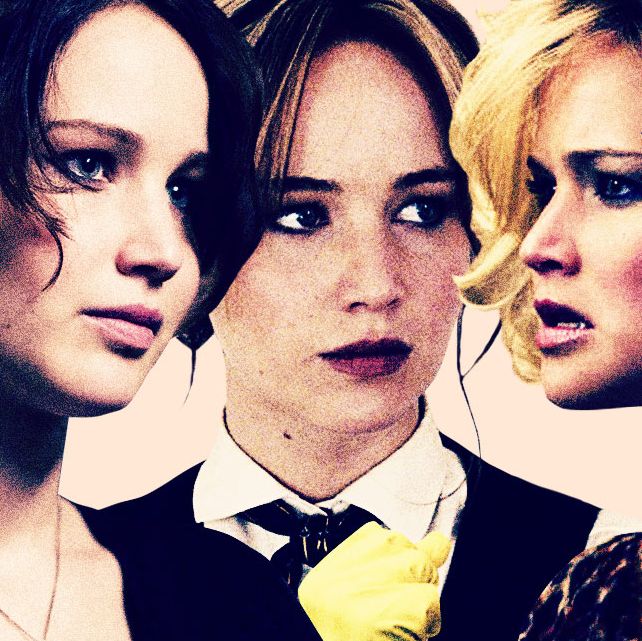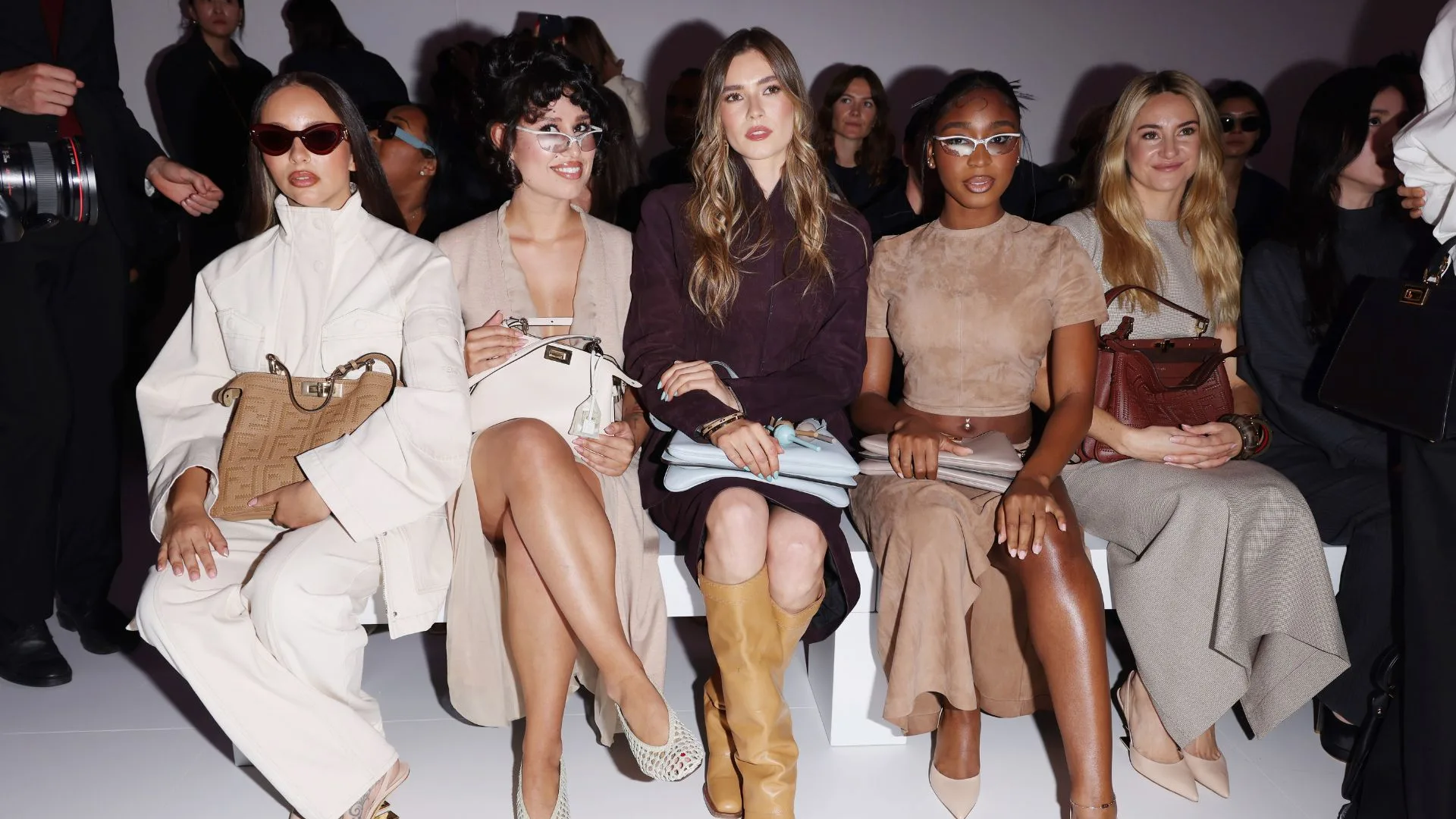
Photo-Illustration: Vulture and Photos by The Weinstein Company, FOX 2000 Pictures, Columbia Pictures and Lionsgate
In a shockingly short time, Jennifer Lawrence has compiled a formidable résumé that’s as impressive for its range as for its string of successes. Starting with her 2010 breakthrough, Winter’s Bone, she’s racked up a series of acclaimed art-house hits, snagging four Oscar nominations along the way. (She won in 2013 for Silver Linings Playbook.) And then there are the massive blockbusters: When she wasn’t running around as Mystique in the X-Men reboot/prequels, she was the moral compass and bow-and-arrow heroine of the Hunger Games franchise.
But box office and awards only partly explain her appeal. Raised in Louisville and discovered on the street in New York by a talent scout when she was a teenager, Lawrence gives off a lively, funny, slightly smart-aleck vibe in interviews that’s a perfect buttress against our celebrity-obsessed times. She plays the part of a glamorous starlet with ease, but there’s a fundamental distrust of fame’s machinery — a sense that she wants us to know that she knows that Hollywood is kind of silly — informing her unpretentious public persona as well as her performances.
As a result, whether she’s taking down dystopias as Katniss Everdeen or making out with Amy Adams in American Hustle, Lawrence isn’t just wholly confident onscreen — she radiates a spirit of excitement that she invites the viewer to share with her. Lawrence’s triumphs, in a weird way, feel like ours as well, because we’re along for the ride. She’s never asked us to bow down to her greatness — for all her range and emotional intelligence, perhaps her greatest talent is still seeming like an ordinary person. So, yes, she’s America’s Sweetheart — or, maybe more accurately, America’s Fun Buddy. Some may read this intro and roll their eyes, arguing that Lawrence’s patented self-deprecation and casual dorkiness are a big act. To which we’ll say: If that’s an act, it’s a really good one — and we’re not tired of it.
When ranking her film performances, we decided to ignore small parts early in her career (Garden Party) or movies that didn’t get a proper release (The Devil You Know). We’re less concerned with overall quality of these movies than with Lawrence’s roles in them, but because she’s been the shining center of so many of her films, that proves tricky. Her best movies seem to vibrate on the same unpredictable, immediate wavelength that she likes to operate on.
This somewhat infamous misfire from Oscar-winning director Susanne Bier features that true rarity: a Jennifer Lawrence performance in which she looks deeply uncomfortable. One of the actress’s most impressive qualities is her ability to hold your attention effortlessly, to look as if acting in a movie is the most natural, normal thing a person could do. But here, stranded alongside Bradley Cooper (who has the same deer-in-headlights look), she’s completely lost as a Depression-era woman who goes mad after losing a child and directs her fury at a woman who had an illegitimate son with her husband years earlier. After years of delay, this was shuffled in and out of theaters for a week in 2013, and with good reason: Both stars would rather you forget this movie ever happened.
An answer to the question, “What if, in an alternative but parallel universe, Jennifer Lawrence was forced to have Jennifer Love Hewitt’s career?” This trashy horror-thriller centers on an abused boy (Max Thieriot) who grows up to wreak havoc on a suburban town and the teenager (Lawrence) who cares about him. It’s pretty terrible, and it only received a wide release because Lawrence had already become hugely famous from The Hunger Games. She’s the only good thing about the movie, providing intelligence and grounding for a character that has neither in the script. Thank heavens she never has to do one of these again.
The directorial debut of Amores Perros screenwriter Guillermo Arriaga has the twisty-turning, multi-story-line structure of that film (and Babel, which he also wrote), but none of the restraint, turning what could have been a moving story into something so stultifyingly self-serious that you’ll suffocate from the lack of air in the room. Lawrence does shine in a smaller role as a flashback version of the lead character played by … Charlize Theron! Is there a universe in which Jennifer Lawrence grows up and turns into Charlize Theron? There is in this movie.
We still contend that a great, nervy, dark romantic drama lurks at the heart of Passengers, if anybody involved in the film had just had the guts to explore it. Instead, audiences got the frustratingly milquetoast sci-fi tale of Jim (Chris Pratt), an engineer who accidentally wakes up nearly a century too early during an interstellar journey to a far-off planet and becomes obsessed with a pretty writer named Aurora (Lawrence), who’s still in hibernation. Tired of being lonely, he awakens her, claiming that her pod malfunctioned like his did. The two fall in love without Aurora knowing about the monstrous thing he’s done to her. A better movie would have dramatized what a despicable violation Jim’s act was, perhaps tying it to the myriad ways that couples lie to each other to maintain control in their relationships. If you saw Passengers, of course, you know that this is not the movie it ended up being — instead, inexplicably, Aurora comes to forgive him. It’s impossible to discuss Lawrence’s performance in Passengers without rehashing this film’s great potential and utter failure, because her character is so central to how we feel about what we’re watching. The Oscar winner makes Aurora alluring — in essence, she’s asked to play Any Straight Dude’s Perfect Woman — but there’s no extra gear for the character, no sly subversion of the male gaze. Before Passengers, Lawrence’s ascension from indie discovery to blockbuster star had been amazingly smooth. This movie was when many started worrying.
Because Lawrence has been such a force on screen, it’s a bit shocking how bland she is in Adam McKay’s satire. Partly, that’s by design: She plays Kate, a mild-mannered, somewhat sarcastic grad student who discovers the comet that’s hurtling toward Earth. One of the film’s central conceits is that because she’s not peppy, she doesn’t make for good TV, which is why the world tunes her out when she warns everyone about our imminent destruction. But the character’s simply not very well written, forcing Lawrence to lean on her own smart-ass persona to get laughs that McKay’s script hasn’t earned. She has some fun alongside Timothée Chalamet’s smitten, dopey skateboarder, but as with so much of Don’t Look Up, you never quite understand why such a huge star devoted her time to this.
One of two 2011 movies in which Lawrence plays Anton Yelchin’s love interest, The Beaver saddles her with the role of Norah, a classmate of Yelchin’s who happens to be the valedictorian and a cheerleader and an artist and super-goofy and deeply sensitive. In other words, it’s a screenwriter’s notion of the ideal high-school crush, which requires Lawrence to bring believability to this dream-girl role, which she does charmingly. But a thin character like this is beneath her talent, and so it’s hard not to be a bit impatient, waiting in vain for her to have a moment where she really gets to shine. Watching her in The Beaver is akin to asking Steph Curry to just shoot free throws or Daniel Day-Lewis to merely read the phone book. Sure, we know they can do it, but that’s not the best use of their time — or ours.
Actress Lori Petty (A League of Their Own) wrote and directed this story — set in 1970s Iowa and based in part on her own youth — about a teenager (Lawrence) who has to raise her two younger sisters (one of whom is played by Chloë Grace Moretz) in a brothel, the titular Poker House. The movie is so deeply felt that it sometimes loses the thread; it has the feel of someone working through her demons, rather than necessarily making a film that’s compelling to watch. But it has legitimate passion behind it, and Lawrence is terrific in an incredibly challenging role. Two years before her breakthrough, she won a jury prize at the 2008 Los Angeles Film Festival for this film.
When Lawrence signed up to play the shape-shifting mutant Mystique — a character portrayed by Rebecca Romijn in the original X-Men movies — it was exciting to imagine her trying her hand at blockbusters alongside a pretty stellar cast that included Michael Fassbender and James McAvoy. But after three films, we confess that we’re still not quite sure what Lawrence brings to this franchise. It’s not that Mystique isn’t important. (She’s Charles Xavier’s adoptive sister who has feelings for Magneto, his soon-to-be rival.) But even in 2014’s very good X-Men: Days of Future Past, where Mystique’s attempt to assassinate Bolivar Trask (Peter Dinklage) is central to the plot, Lawrence seems a bit passive amid the spectacle. Maybe it’s because she’s usually such a forceful onscreen presence that sticking her in the middle of a crowded story line doesn’t quite suit her skill set? Whatever the reason, we wouldn’t shed any tears if she never dons the blue makeup again. These movies probably did wonders for her bank account, but as proof of her multiplex powers, they pale in comparison to Katniss.
Lawrence’s third collaboration with director David O. Russell is easily her weakest. This fictionalized portrait of Miracle Mop mastermind Joy Mangano is long on emotional flourishes but lacks the engaging storytelling that made Silver Linings Playbook and American Hustle so much more satisfying. Lawrence plays the silently suffering Joy, who finally follows her dream — her actively annoying family be damned — as she becomes a successful home-shopping-network entrepreneur. By the time of Joy’s release, Lawrence was a superstar thanks to the Hunger Games and X-Men movies, but she hadn’t lost the common touch that gave her earlier work such authenticity. The actress draws on her earthiness to make Joy an underdog who’s very easy to love. But because the movie’s a mess — filled with so many “colorful” characters meant to be delightfully quirky that you want to hit them with a brick — Lawrence’s sure, steady hand at the wheel has to fight to keep everything running relatively smoothly. She received her fourth Oscar nomination in six years for Joy, but it was the first time that her tart, empathetic essence started to feel a bit routine.
This Sundance award winner is so dominated by the tempestuous, impossible relationship of its central characters, played by Anton Yelchin and Felicity Jones, that it’s easy to forget that Lawrence serves as the film’s third wheel. She’s Samantha, a co-worker who develops feelings for Yelchin’s Über-sensitive Jacob just as things get rocky between him and Anna (Jones). Samantha and Jacob start dating, but she never really has a chance — the guy’s hopelessly hung up on Anna, even though she’s across the Atlantic — and Lawrence makes you feel the pain of loving someone who can’t fully reciprocate. Like Crazy is a movie about how destructive an obsessive relationship can be, and because Samantha is the sane one in the ensemble, she’s doomed. It can be tricky to play the “good girl” — the sweet, nice character who’s going to get walked all over — but Lawrence never makes you see Samantha as a wimp. Quite the contrary: Anybody in the audience would surmise that her character is far more grounded and giving than Anna. It’s just her bad luck that she latched on to a guy too wrapped up in a kamikaze love affair to see how good she could be for him.
Because Lawrence’s portrayal of ballerina-turned-spy Dominika Egorova requires her to undress in order for her character to seduce those around her, it’s inevitable that she’s going to be asked a lot about that decision — especially after being the victim of a photo hack in 2014 that sent nude photos of her streaming across the web. “I feel like something that was taken from me I got back and am using in my art,” she said on 60 Minutes about her role in Red Sparrow, and what’s most fascinating about this just-okay espionage thriller is how the actress both bares all and reveals very little. Trying to stay alive while working for bosses she knows will kill her in a heartbeat, Dominika must learn to develop a poker face, and so Red Sparrow becomes partly a study of how a young woman crafts a series of masks — whether in front of her superiors or around the American spy (Joel Edgerton) offering to save her — while protecting the “real” her somewhere inside. Lawrence’s openness has always been one of her strongest qualities, but here she shuts off almost completely, challenging the audience to decipher what Dominika is thinking at any point in this twisty, pulpy action flick. That mystery is the highlight of this film, which coasts on her daring turn.
The appeal of Lawrence’s portrayal of Rosalyn Rosenfeld — a brash, ball-busting wife and mother with a penchant for garish nail polish and “Live and Let Die” — is intrinsically linked to what’s so entertaining about American Hustle: It’s shameless and broad and very happy to put on a show. She made this David O. Russell con-artist comedy at the height of America’s love affair with the rising young talent, and you can feel her putting aside her penchant for precise, sensitive characterizations and just letting it rip. Sure, it’s a self-indulgent star turn, but Lawrence so delights in Rosalyn’s no-fucks-given attitude that we laugh along with the actress’s moxie. Forget subtlety and restraint: Sometimes being an actor just means wearing loud wigs and garish clothes and rockin’ the gaudiest accent you can muster. She’s a hoot.
When Lawrence was first cast as the lead in the adaptation of Suzanne Collins’s YA novels, the worry was that the young, fiercely talented actress might not be ready for the huge spotlight about to be placed on her. By the time the series ended, she was almost too big for the Hunger Games movies to contain her. That’s how meteoric Lawrence’s rise was between 2012 and 2015, and it’s to her endless credit that none of that ever affected her performance as Katniss Everdeen. She is as powerful and relentless and heroic and relatable in the last film as she was in the first one. She anchors these films — she’s the rock on which the whole enterprises relied upon — and she never stumbles so much as once. Her mere presence elevated the material, to the point that freaking Philip Seymour Hoffman was showing up by the end of this series. She made these movies better than they probably should have been, but never stopped committing to them. This is a fully realized performance over the span of four years. And for what it’s worth: She’s a better action star than most of the Avengers.
Easily the most divisive movie of Lawrence’s career, Mother! encourages multiple interpretations, but what’s clear is that the film is a tidy culmination of everything she’s done to this point. Playing Grace, the young, adoring wife of a creatively blocked poet (Javier Bardem), Lawrence gives a gutsy performance that starts off tense and only gets crazier and more ferocious. Grace just wants to refurbish their gorgeous, dilapidated home and start a family, but an alarming number of strangers start coming to the house and then refusing to leave. A metaphor for the Garden of Eden? A commentary on the polluting of the Earth? A treatise on the struggles of a spouse who has to share her artist husband with the world? However you land on the real meaning of Mother!, Lawrence makes us feel the slowly growing terror of her character’s situation — especially when she gets pregnant and discovers that she alone must safeguard the unborn child. The powerfully protective maternal energy of Winter’s Bone mixes with the scared-shitless empathy she brought to House at the End of the Street, not to mention the effortless, no-nonsense command that won her an Oscar for Silver Linings Playbook. Mother! takes major narrative and tonal risks — its Cinemascore grade is an F, one of only 19 ever given to a movie — but this is the kind of audacious movie that requires the daring and poise of a true movie star. Lawrence delivers, stunningly.
A young actor longs for a breakout role — that perfect piece of material that she can do better than anyone, that shows off what she’s capable of achieving. Jennifer Lawrence’s mom had read Daniel Woodrell’s 2006 novel, about a young woman fighting to save her Ozarks home, around the time of its release, and told her daughter, who was raised in Louisville, that she had to play this character in a movie. Just a few years later, Lawrence auditioned for the role. “The lifestyle is different,” she later said about the similarities between Louisville and the rugged rural environment of Winter’s Bone, “but some of the sayings were the same. I was comfortable in the dialect.” Beyond being her coming-out party, Winter’s Bone has served as Lawrence’s permanent badge of authenticity: Not only was it a Sundance darling and a Best Picture nominee, but the film helped cement in the public’s mind that this actress was no Hollywood glamour puss but, rather, a “real” person. That impression is a testament to how bone-dry believable she is as Ree, a no-nonsense Midwestern teen who’s had to be the adult in her family for far too long. (Her mother has mental-health issues, and her father has gone missing.) There’s not an ounce of pretense in her performance — no second where we think she’s grubbing herself up to play this impoverished woman. Ree’s harrowing journey becomes so compelling in part because it feels like there’s so little distance between the actress and the character. Lawrence received her first Oscar nomination for Winter’s Bone — she was only 20 — but her preternatural poise left little doubt that we’d be hearing a lot more from her.
Everything in David O. Russell’s 2012 romantic comedy of Philadelphian mental patients feels dangerously close to careening out of control: The movie is both nervous and dangerous, in a way that still feels revolutionary years later. Lawrence and Cooper, as the screwed-up couple at the film’s center, have chemistry that is both combustible and deeply involving. They’re either perfect for each other or they’re gonna kill each other, and Russell — a director who, for better and for worse, tends to feel more than he thinks — hits the exact right notes. And when in doubt, he just turns the camera on Lawrence, who, playing a character that she’s admitted she “didn’t entirely understand,” basically blows everyone else off the screen every second she’s on it. It’s hard to pinpoint the exact moment that Lawrence won her Oscar, but for our money, it’s the moment when Robert De Niro, one of the greatest actors of the last 100 years and a cinematic force the likes of which we’ve never seen, begins to pipe up about Lawrence being a bad influence on his son and costing his beloved Philadelphia sports teams “bad juju,” and Lawrence shuts him down, kicks him into the floor, and then slugs a Budweiser in triumph. She’s the most powerful force in the room, always, whoever else is in the room. Even De Niro.
Grierson & Leitch write about the movies regularly and host a podcast on film. Follow them on Twitter or visit their site.






